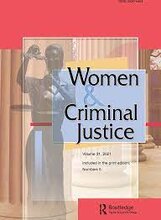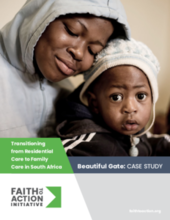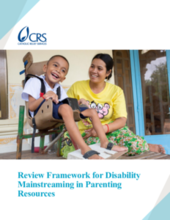Displaying 1661 - 1670 of 14348
This study examines the perceptions of 145 incarcerated mothers of minor children in a large Midwestern jail to understand the correlation between where their children are living during their incarceration and the mothers’ feelings about these placements and relationships with their children. Mothers were most satisfied if children lived with maternal grandparents, and least satisfied if children were in foster care. Women with higher scores for the relationship with close relatives, those having contact with their child(ren) while incarcerated, and mothers with no children in foster care reported feeling better about these placements. The findings highlight the importance of women maintaining contact with their children and their children’s caretakers while incarcerated.
Engaging with key stakeholders is an essential part of any transition and must be handled with tact and wisdom. Located in South Africa, the organization Beautiful Gate began its ministry to protect street children and later grew to provide residential programs for children in need. Yet, as they began to learn more about the needs of children in families, they decided to shift away from residential care and expand their services to include the families of the children they served. This case study summary explains how Beautiful Gate communicated these changes with donors.
This case study documents the successful transition of Beautiful Gate, a children's home in Cape Town, South Africa, from the orphanage model to a family-based and community-based approach.
India Alternative Care Network is calling for contributions to its newsletter, IACN Quarterly.
This Framework for Disability Mainstreaming in Parenting Resources is a tool to help organizations and practitioners to review existing parenting resources in terms of information and content gaps, limitations of instructional guidance, and at-home activities. The aim of the framework is to ensure parenting resources are inclusive of the needs of parents of children with disabilities ages 0 to 17 years.
This article explores neighbour protective intervention (protective informal social control) in child neglect. It draws on narrative interviews with seventeen female parents from seven settlements in Ghana.
The Eastern and Southern Africa Regional Learning Platform hosted a webinar on April 13, 2022, featuring a panel of people with liv
This study looked at how well matched children in England are to their homes and the extent to which their participation, views, wishes and feelings are considered in the decision-making process. The study looked at a small group of children who have a very wide and diverse set of needs and who live in children’s homes that were visited by Ofsted inspectors in late 2019.
New research conducted by Ofsted found that just over half of children living in children's homes in England had residential care included in their care plan. This "illustrates the challenges faced by the children, and by social workers and commissioners trying to find suitable care for them, as well as by the children’s homes that are aiming to meet the children’s needs,” according to the report entitled Why Do Children Go Into Children's Homes?
11.5 months, home-based in Italy with monthly field travel






